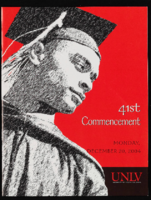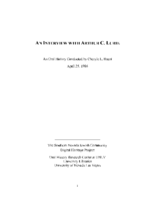Search the Special Collections and Archives Portal
Search Results
George Laurence Ullom Photograph Collection
Identifier
Abstract
The George Laurence Ullom Photograph Collection (1915-1974) contains photographic prints and negatives created by Las Vegas, Nevada photographer George Laurence "Larry" Ullom. Larry owned and operated Ullom’s Desert Art Studio, which was located in Las Vegas, Nevada. The bulk of the collection consists of Ullom's wedding chapel photography. The collection also includes his photography work for the Bureau of Reclamation, the Agricultural Extension Service, and the Associated Press, Atlantic News, and Acme news bureaus.
Archival Collection
Terry Wilsey Papers on the Las Vegas, Nevada LGBT Community
Identifier
Abstract
The Terry Wilsey Papers on the Las Vegas, Nevada LGBT Community (1979-2002) are comprised of records from the Las Vegas Gay Switchboard, the Nevadans for Human Rights, and other LGBT community groups based in Las Vegas, Nevada. The collection contains newsletters, agendas and meeting minutes, informational pamphlets, as well as photographs, programs, and a VHS recording of local theatre productions.
Archival Collection

Deryk and Melissa Engelland oral history interview: transcript
Date
Archival Collection
Description
Oral history interview with Deryk and Melissa Engelland conducted by Barbara Tabach on May 23, 2019 for the Remembering 1 October Oral History Project.
Deryk Engelland is a professional hockey player and team spokesperson for the Vegas Golden Knights in Las Vegas. He and his wife, Melissa, discuss the events of the October 1 shooting and how the Golden Knights chose to honor the community that they were representing after this tragic event. Deryk and Melissa Engelland established the Vegas Born Foundation to honor first responders and community heroes, and the couple talks about the organization's accomplishments since its inception.
Subjects discussed include: Las Vegas healing.
Text
David Sinclair (University of Nevada, Las Vegas) oral history interview conducted by Kelliann Beavers and Peter Grema: transcript
Date
Archival Collection
Description
From the Lincy Institute "Perspectives from the COVID-19 Pandemic" Oral History Project (MS-01178) -- Education sector interviews file.
Text

University of Nevada, Las Vegas (UNLV) 41st commencement program
Date
Archival Collection
Description
Commencement program from University of Nevada, Las Vegas Commencement Programs and Graduation Lists (UA-00115).
Text

Program for National Conference of Christians and Jews event to honor Eileen Brookman, 1979
Date
Archival Collection
Description
In 1979, Eileen Brookman was honored as a Distinguished Citizen of the Year by the National Conference of Christians and Jews for her continued service to the community. The program includes highlights of her accomplishments.
Text

Transcript of interview with Arthur "Art" Lurie by Cheryle Bacot, April 25, 1986
Date
Archival Collection
Description
Interview with Arthur "Art" Lurie by Cheryle Bacot on April 25, 1986. Lurie talks about his family and upbringing with Kenny Washington, who was the first African American to sign with the National Football League. Lurie discusses knowing everybody in Las Vegas in the 1950s, being in the service/retail sector and watching the city grow. He operated several businesses including grocery stores and the liquor department at Wonder World. He talks about his love of boxing, serving on the boxing commission, and advantages of living in southern Nevada.
Arthur C. Lurie lived in Las Vegas for 33 years at the time of this 1986 oral history. He and his wife Eleanor had relocated from Los Angeles area to help run his brother-in-law's food market. Over the years his career would include the grocery, bar (Art's Place) and restaurant businesses; including being co-owner of the liquor store at Wonder World. He shares memories of adjusting to the more laid back culture of small town Las Vegas and how he feels like a native after watching the city grow over the past decades. Art was a founding member of Temple Beth Sholom, where he served as an early vice-president. Being in the non-gaming sector provided gave him the opportunity to work with youth programs and he started the Golden Gloves gym in Las Vegas. He judged over 40 title fights and had a long career on the Nevada Boxing Commission. Arthur Lurie past away in 2014 at the age of 96.
Text

Transcript of interview with Roy Brown by Rick Godwin, May 21, 1976
Date
Archival Collection
Description
Text

James Matson interview, February 23, 1980: transcript
Date
Archival Collection
Description
On February 23, 1980, Ken Rose interviewed James Matson (b. July 14, 1923 in Pensacola, Florida) about his life in Las Vegas, Nevada. Throughout the interview, Matson discusses his childhood, life in Florida before moving to Las Vegas, his family and what brought him to Las Vegas. Matson also delves into his economic struggles and those of the community, his attempt to purchase a home and the changes he would like to see in society. Moreover, Matson talks about his hobbies, his work in construction and interracial friendships. The interview ends with Matson discussing the city of Las Vegas, the weather and the changing buildings.
Text

